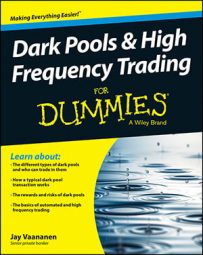Dark pools are simply venues or conduits where stocks are traded. Think of a dark pool as a platform where all sorts of players — or, as the pros like to say, market participants — come to trade stocks. Unlike traditional stock exchanges, those market participants trading in dark pools have little idea of whom it is they’re trading with.
There’s always been a need to trade off exchange. And there’s nothing new or nefarious about doing so. After all, a buyer is always looking to buy at the lowest price possible, and a seller is looking to sell at the highest price possible.
Often a big institution has a large block of shares to buy or sell. If that institution just put its order out on a stock exchange for all to see, the price might spike upward or crash downward. That doesn’t make much sense. So before the days of dark pools, brokers would get together with other brokers outside trading hours to try to match large orders. After they agreed on the deal, they would settle the trades on the exchange when it opened.
As the markets and trading volumes grew, a need arose for alternate places to the traditional stock market, which explains in a nutshell how dark pools started.
Nowadays the activity in a dark pool consists of everyone who trades, which may include the everyday investor as well as the large institutional investors. No matter how big or small the order is, dark pools are a part of the modern equity markets.
Most major banks and brokers have their own dark pools where they try to match trade first without sending the order to a stock market. If they can’t match the trade in their own dark pool, they may route it to another dark pool or multiple dark pools. Only as a last option will the trade end up on the stock market. Often a trade never even reaches a stock market; it’ll be executed in one of the pools beforehand.
All the investors who operate in a stock market are involved in a dark pool to some degree, either as a platform provider or a trader. A platform provider is simply the entity (most often a bank or a broker) that supplies and operates the dark pool, whereas a trader is the one who uses the dark pool to buy and sell stocks. Traders can include market makers, banks, institutional investors, high frequency traders and private investors. Some of the participants won’t even know their trade has been executed in a dark pool.
The name dark pool hints at secrecy, which is exactly what the pools have been for a long time. But when something is as big as the global financial markets, trying to keep a growing business secret has become impossible, and more and more journalists, academics and regulators have become interested in the goings-on in dark pools.

